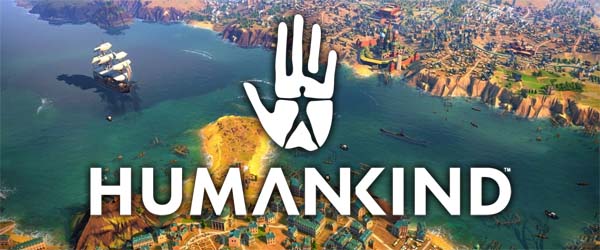
It's going to be virtually impossible to review Humankind without frequently comparing it to iterations of Sid Meier's Civilization. Civ has absolutely dominated (and almost completely monopolized) the historical turn-based strategy genre. There have been plenty of space and sci-fi-themed 4x strategy games, ranging from Master of Orion, to Galactic Civilizations, to Stellaris, and even Amplitude's own Endless Space; but not a whole lot in the more Earth-bound sub-genre. I've also been a huge Civ fan (as the readers of my blog can no doubt tell), so it's hard for me to look at any game in this genre and not partially judge it through the lense of comparing it to Civ.
So I'm not even going to pretend to judge Humankind strictly on its own merits, in a vacuum. I simply can't. I'm not sure if anyone can. Amplitude, as a company, clearly looked to Civ for inspiration, took lessons from the successes and failures of its previous strategy games, and said "hey, we want a piece of that pie too." But despite the surface-level comparisons to Civ, Amplitude takes a very different approach to game design. While Civ has always been very firmly rooted as a "digital board game", Humankind takes a much more story-driven and "simulationist" approach, akin to the sort of thing that you might see in a game like Crusader Kings. I think this approach works, and it does a good job of separating Humankind from Civilization.
Culture wars
Perhaps the biggest deviation that Humankind makes from Sid Meier's Civilization is the way that it handles the game's civilizations themselves. In Humankind, you don't play as a single civilization throughout an entire campaign. Instead, each era you have the opportunity to select a new culture from a list of era-specific cultures. I like this concept a lot in principle, but also have some misgivings about the way it works out in practice.
Empires transition into a new culture at the start of each era.
On the one hand, it's great to see a game like this recognize the fact that civilizations aren't singular, monolithic cultures that exist forever, unless they are conquered or die off completely. That gaming paradigm (which Civ has always embraced) ignores the reality that cultures change and evolve over time. They change with the times, and blend elements from other neighboring cultures. And even if a nation or empire falls or collapses, it doesn't just disappear off the face of the planet overnight. It's people get absorbed into whatever nation or empire replaces it, and those people continue to influence the development of that new culture.
But this isn't exactly how Humankind works. The cultures of the game don't gradually transition or evolve due to social, economic, political, or geographic pressures and influences. Instead, at arbitrary points throughout the game, each empire completely changes its culture in a single game turn. And you aren't locked into choosing a related or similar culture either. You can pick any culture that is still available from the given era, no matter how separated that new culture might be from your old culture -- whether that be geographic separation, ideological separation, or even racial separation. I can be Greek one turn, and then suddenly be Aztec the next, and be Khmer the following era.
I was hoping for a system in which players would have to select from a list of related cultures when transitioning into a new era. For example, I was imagining that being Classical Romans means that, when the medieval era hits, I would have to chose between a related culture like Byzantine, Holy Roman, Ostrogothic, Franks, or Papal States. Then, depending on which I picked, my culture would continue to shift to another related culture in the following era. For example, if I picked Byzantine as my medieval successor to Rome, then my early modern culture choices would be things along the lines of the Ottomans or Orthodox Rus; whereas, if I had gone with the Papal States or Holy Roman Empire, then my choices would be things like Venetian, German, or French.
Changing cultures each era is no more silly than ancient
Abraham Lincoln leading ancient America in a bear-skin hat.
Instead, these transitions from one culture to another over the span of a single turn can be very jarring in Humankind. But I guess it's no less jarring than seeing an ancient era Abraham Lincoln leading America in 4000 B.C.E. while wearing his silly bearskin tophat.
I hope that if Humankind gets expansions, that those expansions will modify this culture-changing mechanic so that there are more cultures available each era, but your choices are limited to cultures that are related to the one you were playing in the previous era. Maybe it costs influence (or maybe even fame) to change cultures, and changing to an un-related culture costs more than changing to a closely related one. I know it can be difficult to find such examples of related offshoots for every possible culture, especially for cultures that were conquered or died off in real life, but I think it's a solvable problem.
It's easy to come up with possible successors to the Roman Empire, because every culture in Europe and Asia Minor seemed to claim succession from Rome. It's a lot harder to come up with related successors to culture like the Aztecs or Maya, and it would seem insensitive or outright offensive to limit the choice of succession to the colonial European cultures that had conquered or massacred them in real history. But there are options. In the case of the Maya or Aztecs, successor options could include cultures like the various Pueblo or Navajo cultures, but I admit that's kind of a stretch.
[More]
a4a8da10-6ef4-4c31-ace5-83a2acd8f305|0|.0
Tags:Humankind, Amplitude Studios, strategy, grand strategy, history, steam, PC, Sid Meier's Civilization, neolithic, outpost, colony
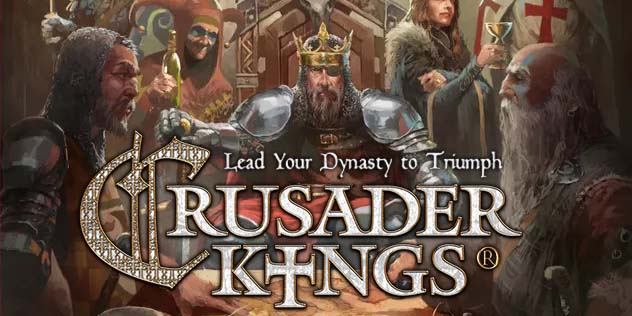
I wasn't very surprised to see a game like Sid Meier's Civilization adapted to a board game. Civ (the computer game) was always heavily inspired by board games to begin it, and so it's mechanics translated easily back into board game formats without losing much other than the broader scope of the PC game.
Paradox's Crusader Kings, on the other hand, is a totally different beast of a PC game. It is an insanely complicated, system-based blend of grand strategy game, RPG, and social sim. It simulates thousands of individual characters across hundreds of countries and duchies through dozens of generations. The possibility space is vast. As such, I would never have expected to see anyone attempt to try to boil down this deep historical simulation into a tabletop board game. Well, I guess I shouldn't say "never". In this age of every media property being adapted to board game formats, I suppose it was inevitable for someone to try.
And someone did try. In 2019, a year before the release of the Crusader Kings III PC game, Swedish board game manufacturer Fria Ligen ("Free League Publishing") released a board game version licensed by Paradox. I received the game as a gift last fall (during the height of social distancing during the COVID-19 pandemic), and so didn't get to start playing the game until well into 2021, when we finally felt a little more comfortable meeting up with friends.
As much a story-generator as a board game
For any PC players coming to the board game, there is something very important that you should know about Crusader Kings: the Board Game: it's focus is largely on the story-telling aspect of the Crusader Kings experience. If you play the Crusader Kings PC game as a hardcore strategy game, then you will probably find the board game lacking in that respect. The Crusader Kings board game is as much a story generator as it is a strategy game -- perhaps moreso.
As a story generator, my friends and I have found Crusader Kings to be very entertaining. It's certainly one of the better story-telling games that I've ever played.
Each action card will include a random event that is either disruptive to the current player,
or which benefits another player.
The way that Crusader Kings creates its little stories is through the random events of each player's action cards, and through the resolution of events by drawing trait tokens. Each turn, a player plays a pre-selected card from their hand. You perform your chosen action, and then you resolve a random event on the card. All cards, except for the "Crusade" action cards, will have a random event that is either harmful to the active player, or which provides a benefit to another player (usually the next player in the turn order).
Many actions and card events will also require that the player draw traits from a bag (similar to a die roll in most other games). Each player character starts with a pre-determined set of traits at the start of the game, and can acquire new traits through marriages, succession, or other events. All your traits go into a bag, and you draw one or more blindly from the bag to resolve a given trait check and determine the outcome of an event.
Player actions, card events, and trait draws, thus combine together to create emergent stories in both the short and long term. Sometimes these little stories can play out over the course of a few actions or turns. Other times, game-long narratives can form. [More]
34573e81-f1df-4d97-b5bc-74233cbd3e71|0|.0
Tags:Crusader Kings, Paradox Interactive, Free League Publishing, emergent narrative, grand strategy, history, medieval, Europe, crusades, war, casus beli, dynasty, succession
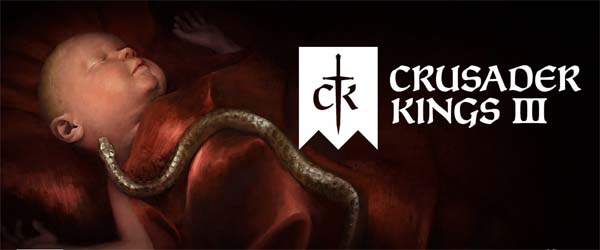
My blog readers know that I'm a fan of historic strategy games. Two of my favorite PC game franchises are Civilization and Total War, and I've dipped my hands into plenty of other historic strategy games ranging from the prehistoric Dawn of Man, all the way to Ultimate General: Civil War and Company of Heroes. But there's one prestigious set of historic strategy games that I've yet to get into. That is Paradox's historic strategy lineup of Crusader Kings, Europa Universalis, and Hearts of Iron. I own Crusader Kings II and Europa Universalis IV on Steam, and I've always wanted to get into them. I have a friend who plays them a lot, and the game looks really fun, but I was just never able to figure either of them out.
I tried booting up both a couple times and was just immediately overwhelmed. I tried the Crusader Kings II tutorial twice, and still didn't feel like I had a firm enough grasp on the game to feel compelled to keep playing. Part of that is because both games have myriad expansions and DLC that have just further complicated the games and repeatedly raised the bar of entry for newcomers. The only one of Paradox's tutorials that I felt gave me a reasonable grasp on the game was the tutorial for Stellaris.
When I saw previews for Crusader Kings III, I immediately put it on my watch list and committed myself to buying it day one, so that I could get in on the ground level in the hopes that it will be easier to grasp before Paradox starts releasing countless DLCs. It seems to have paid off, as I've been hooked on the game on and off since launch, and that addiction has cut into my Civ playing time, as well as delayed many of my blog projects and YouTube content. So for those of you eagerly awaiting new Civ strategies or the next installment of "How Madden Fails to Simulate Football", you can blame Paradox Interactive for the delay...
I am not the state
As someone who was never able to get into the previous game, I cannot say if Crusader Kings III is "dumbed-down" compared to its predecessor. It is, after all, still insanely complicated. But I definitely feel like it has a gentler learning curve and a much more effective tutorial compared to its predecessors. The hand-holding of the tutorial really did help me get a better understanding of how the various mechanics were working, and I've also found it much easier to navigate the revised U.I. and find the information that I'm looking for. I still feel like I have no idea what many of the U.I. panels mean, but I at least understand enough of the basics this time around to actually feel comfortable playing the game.
If you're unfamiliar, Crusader Kings is a medieval grand strategy game in which you play as the king of a small, European (or Middle Eastern or African) kingdom. You engage in diplomacy and court intrigue to increase your wealth and power, fight wars to conquer territory, and manage your growing holdings. But unlike a game like, say Civilization, you do not play as an abstraction of the state itself. Instead, you play as a line of rulers in a single family dynasty. You play as a single king (or queen) character at any given time. This king grows old, and eventually dies, at which point, you take control over you chosen heir and continue playing the game as that character. If you ever get to a point in which you have no family heir to carry on when you die, it's Game Over.
When your player character dies, you take over as that character's primary heir.
As much improved as the tutorial is, I do feel that it has one glaring weakness: it doesn't really cover succession. The tutorial basically puts you in control of a 40-year-old king in Ireland. It shows you how to press a few claims, use a casus belli to press those claims, create a title, deal with vassals, marry off a child, and then it basically just hands you the reigns and says "OK, now keep playing". And yeah sure, these are all the things that you spend most of the game doing. But I would say that arguably the most important part of the game is declaring your heir and setting up your inheritance to maximize the territory that your primary heir retains power over. I think succession is the single most important part of the game, and the tutorial doesn't cover it at all. When it finally happens, there's a tool tip that pops up to explain some stuff, but it didn't really help me all that much to understand what was happening, and a tool tip popping up after the fact certainly didn't help me to prepare for my king's inevitable death and inheritance. [More]
eb8fb312-cf3a-447e-aaf9-982c809e4e0e|0|.0
Tags:Crusader Kings, Crusader Kings 3, Paradox Interactive, Paradox Development Studio, strategy, grand strategy, RPG, history, simulation, medieval, king, Europe, crusades, war, casus belli, dynasty, inheritance

Last year, after my initial enthusiasm for Civilization VI began petering out (until the announcement of the expansion), I went on a bit of a space-4x bender. I spent some time with the rebooted Master of Orion. It was good, but I was underwhelmed by its limited scale and casual depth. I also planned on hitting up Endless Space 2. I played the first Endless Space briefly off-and-on, and I liked it, but kept getting diverted to other games and projects and never really allowed myself the time to get comfortable with the game.
But first, before diving into Engless Space 2, I wanted to tackle a game that's been in my library for over a year: Stellaris. This is an epic, space 4x strategy game developed by Paradox Interactive -- the same developer who brought us the infamously complex and detailed Europa Universalis and Crusader Kings series.
A gentler learning curve than Europa Universalis
I was hesitant to try Stellaris because of its relationship to Europa Universalis (and its notorious complexity), but I was surprised to find that Stellaris has a bit of a gentler learning curve. Instead of starting you out "in median res" with a developed European kingdom with armies already mobilized, alliances and rivalries already in place, and wars already in progress, Stellaris starts you out in control of a single planet in a single star system, with just a small fleet of corvettes, a construction ship, and a science ship at your disposal. You send your science ship to explore the other planets in your system, then on to the nearest star, and slowly explore from there at a much more comfortable pace that is akin to a game like Civilization or Master of Orion. Unlike with Crusader Kings and Europa Universalis, I didn't feel like I needed to sit down with a history textbook in order to know what was going on at the start of my game.
You start the game with a single science ship to explore your own star system, and work your way out from there.
Don't let this initial apparent simplicity fool you. Stellaris is still quite deep, quite complex, and the galaxy that you'll explore really does feel vast. While the Master of Orion reboot has galaxies with a mere dozens of stars (very few of which contain more than one or two planets), Stellaris features a default galaxy size consisting of hundreds of stars, most with their own planets, which might (in turn) contain moons.
There's still going to be some trial and error, as you'll make a lot of mistakes and miss a lot of opportunities in your first few games. If you left the "ironman" mode disabled, then you'll at least be free to re-load earlier saves and try to play better if anything goes horribly wrong. However, Paradox throws a bit of a curve ball at players by disabling achievements if you disable ironman mode. You won't stumble into achievements in your learning game(s) or by save-scumming; you'll have to earn them in the Ironman mode!
You also won't be able to manually save while in Ironman mode. You have to wait for the game to perform an auto-save (which I think happens every few in-game months, or maybe every year?). This can be very annoying if you don't notice the "saving game" popup and don't know if the game has saved your most recent actions. It's fine to include a single save file for this mode, but they could at least include a "Save and Exit" option in the pause menu! [More]
2caf8b87-93d3-4596-b06c-1db37d776061|0|.0
Tags:Stellaris, Paradox Interactive, strategy, grand strategy, 4x, science fiction, space, faster than light, hyperspace, wormhole, anomaly, research, terraforming, war, diplomacy, Master of Orion, patch, Skinner Box, Star Trek: Birth of the Federation
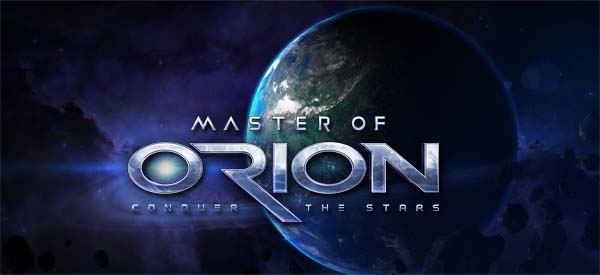
The 2016 reboot of Master of Orion kind of shoots itself in the foot a bit with its own subtitle: "Conquer the Stars". When I play 4x games, I like to feel like I'm really building an empire, managing an economy, and conducting diplomacy. All of those things are present in Master of Orion, but I've gotten a pretty distinct feeling that this is yet another strategy game that falls victim to military rushing being the optimal strategy by far. Master of Orion doesn't really want you to build a civilization and colonize the galaxy; it firmly wants you to do what its subtitle tells you: conquer the stars.
Master of Orion III was kind of shit (it was boring, ugly, and completely lacked personality and substance), but at least it made some effort to be new and interesting. Most noticeably, the galactic map was actually three-dimensional. Sure, this was a navigational and UI nightmare for the human player, but it required players to think differently about how they approached expansion and warfare. At a more fundamental level, MoO3 sought to be a game about macro-management, asking the player to manage a vast galactic empire rather than just a collection of a dozen or so planets. The meat of the game, thus, was intended to be in the mid-to-late stages, as developed empires engaged in epic battles for survival, rather than all the fun and challenge being front-loaded in the early rush to colonize all the nearby planets. It didn't work, but at least it was trying to genuinely innovate the 4x genre.
The new Master of Orion isn't anywhere near that ambitious, and seeks instead to simply bring the original Master of Orion concept (in its simplest form) into the age of high-resolution 3-d graphics. It's a scaled-down, bog-standard space-4x game that borrows heavily from Endless Space and Civilization V. But it is at least a competent one!
Conquer the Stars isn't as big, complex, or ambitious as Master of Orion 3, but at least it's competent.
The galaxy itself isn't very big this time around. Depending on the map's size, there's only a few dozen stars, and most of them only have two or three planets. Unstable star lanes and space monsters can lock you out of exploring certain systems until you research certain technologies or grow your military sufficiently large (respectively). Other than that, exploration is over fairly quickly (especially once you start performing map trades in diplomacy).
Planet-management is also fairly easy. You can assign population meeples between one of three different types of output: food, production, and research. Meeples of different jobs and races have different icons, and unhappy meeples on strike have icons that sit down holding a picket sign. It makes it very easy to see what your population's current status is at a glance. There's just not really much to do with them. You don't have to assign them to work specific buildings, and with only 3 outputs to manage, balancing or specializing isn't that difficult.
All the buildings in the game are also one-time builds that don't serve much function other than to provide flat points of one of the three outputs, or to modify the efficiency of meeples in a particular output category. Buildings that have unique functionality (such as the Spy Center, Gravity Generators, or Interplanetary Administration) are few and far between. The only other thing that you do with your planets is to occasionally terraform them in order to boost your max population and unlock additional slots along each of the output tracks.
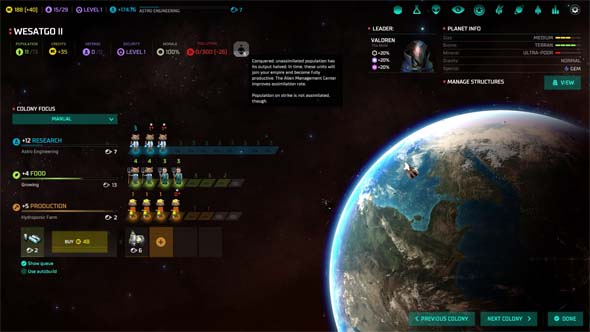
Each point of population is of a specific race, which affects the morale of conquered planets.
The tech tree also feels kind of bland and linear. I would much prefer a tech web along the lines of Civilization: Beyond Earth. Master of Orion kind of goes in this direction a bit by including some techs in which you have to chose which of two different items you want to take when you research certain techs. You can then trade for the other via diplomacy if you want to. It's kind of like the leaf nodes in Beyond Earth, but only some techs have them, and I rarely had to think too hard about which one I wanted... [More]
b529f082-d6e2-4759-8316-2633e3e77143|0|.0
Tags:Master of Orion, Master of Orion: Conquer the Stars, NGD Studios, Wargaming Labs, Steam, strategy, grand strategy, 4x, turn-based strategy, PC, science fiction, space, exploration, expansion, exploitation, extermination, colony, war, Michael Dorn, John de Lancie, Mark Hamill, Alan Tudyk, Nolan North, meeple, Master of Orion 3
|

| 12 | | | | | | | 60 | | 11 | | | | | | | 55 | | 10 | | | | | | | 50 | | 09 | | | | | | | 45 | | 08 | | | | | | | 40 | | 07 | | | | | | | 35 | | 06 | | | | | | | 30 | | 05 | | | | | | | 25 | | 04 | | | | | | | 20 | | 03 | | | | | | | 15 | | 02 | | | | | | | 10 | | 01 | | | | | | | 05 |
|